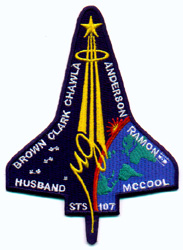Join us this Friday night, February 1st, at 8 pm for a special tribute to the shuttle astronauts at our Shabbat Service. (Tot Shabbat, our monthly early service, will be at 6:30 pm as usual, ending just before)

By Rabbi Mark Blazer
On January 16th I stood in awe watching the Space Shuttle Columbia blast off into space. Nearly 4 miles from the launch site, I was surrounded by family and friends of the astronauts on board STS-107. All of us had the same prayer--that we would not bear witness to a tragedy like Challenger. We were so relieved when the ascent was flawless. Through the loudspeakers we heard Houston assume flight control signaling that the initial danger period was over. We breathed a collective sigh of relief.
And now, 16 days later, our world has lost seven heroes. In an instant, the expectant joy at their safe return, has turned to sorrow and mourning. Our thoughts and prayers go out to the families of the crew, Rick Husband, William McCool, Mike Anderson, Dave Brown, Kulpana Chawla, Laurel Clark and Ilan Ramon.
Thanksgiving, November 28, our family sat together with the Ramons around my father’s table. We talked about American history, as well as our future. Exactly seven weeks later, Col. Ilan Ramon would be taking off into space aboard Space Shuttle Columbia. After so many delays, years of training and waiting, the mission looked like it was finally going ahead. The last few days in Los Angeles allowed the Ramon family to unwind before the inevitable stress of the days ahead.
Ilan was a natural optimist. His eldest son recently celebrated his Bar Mitzvah in Houston, and they expected to celebrate his next eldest son’s Bar Mitzvah back in Israel. He was looking forward to reuniting with family and friends after being separated for years. Ilan was especially inspired by his mother, a survivor of Auschwitz. She had instilled within him hope for the future. “Probably the fact that I’m the son of a Holocaust survivor is even more symbolic” than usual. “I’m proof that even with all the hard times we are going forward.”
After dinner as we sat talking, a movie was playing in the background, though no one was really paying attention. It was 2010: The Year We Make Contact. A scene with Roy Scheider attending to some disaster aboard his spacecraft, fires and explosions, suddenly grabbed our attention. Ilan’s wife Rona, not missing a beat remarked, “We don’t think about such things.”
Ilan was a soldier who had a long history of placing his life at risk, defending his country numerous times since taking to the skies in the early 70’s. A 19 year old pilot flying combat missions during the Yom Kippur War; a teenager, yet already a hero.
Col. Ramon took this last mission seriously, and was deeply honored to be Israel’s first astronaut. But he confided in me that he felt that he had already played a significant role in history. Some twenty-one years earlier he was one of the pilots who destroyed the Osirak nuclear reactor in Iraq. He had helped protect the entire planet from possible nuclear war.
And at the end of the evening as we said goodbye, I wished him nesiah tova, a safe journey, the Hebrew bon voyage. I realized this was the first time I had ever said these words to someone going up into space. How different this was from the usual journeys we humans take around our planet. These flights into space have come to seem routine as well. They of course are not. They are a testament to the extent of our capabilities, as well as our limitations. A journey into space is the pinnacle of human achievement, but still a reflection of the fragility of our existence.
www.beliefnet.com/News/2003/02/Seven-Heroes-Seven-Faiths.aspx


 RSS Feed
RSS Feed
